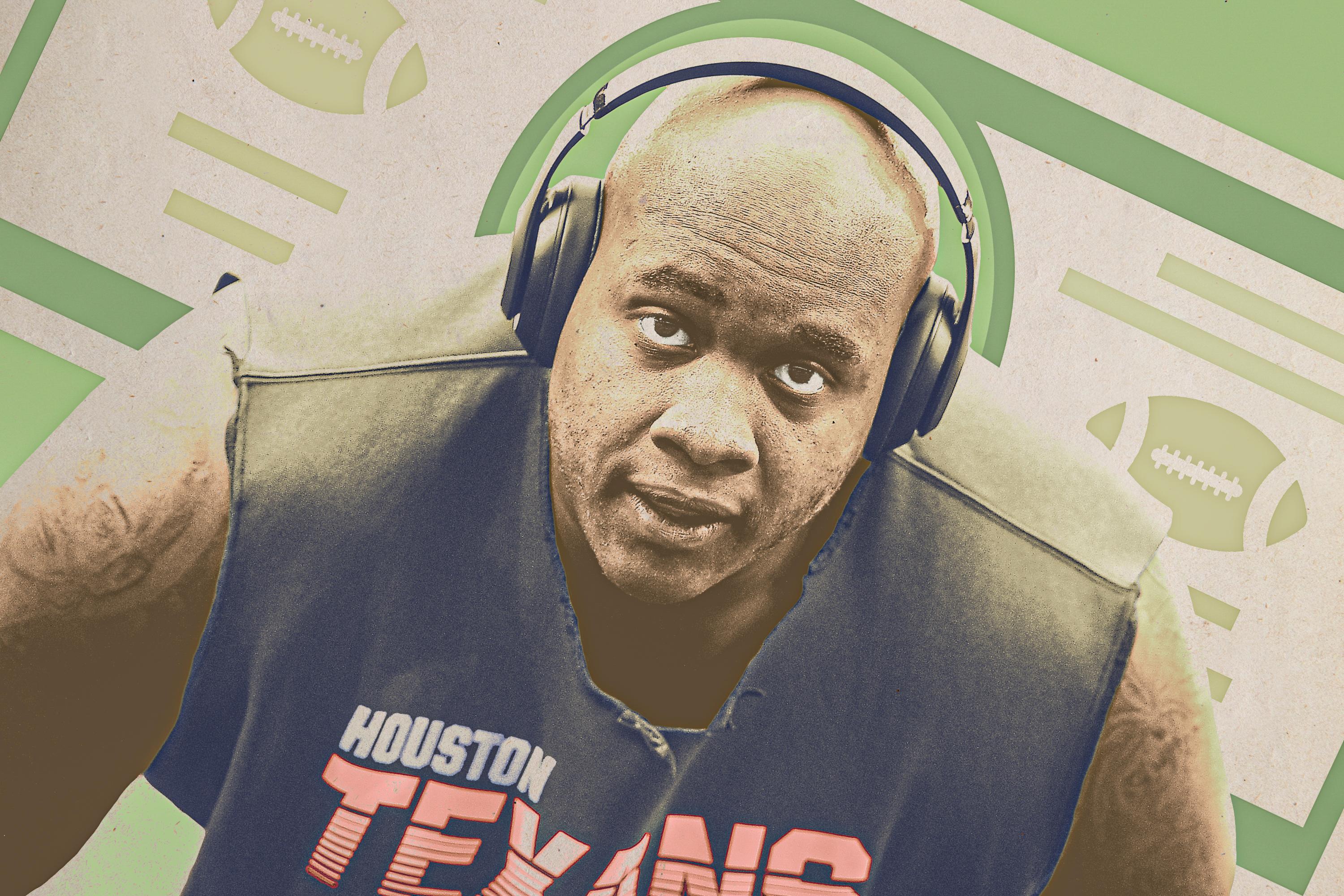Laremy Tunsil Bet Big on Himself and It Paid Off
He’s endured a disastrous draft night, losing seasons, coaching changes, and trade rumors. When the Texans offensive tackle had the opportunity to exert more control over his career, he seized it by negotiating his record-setting contract extension without an agent.
This week marked the one-year anniversary of a series of trades made by Texans coach/general manager/comeback machine Bill O’Brien. On August 31, 2019, O’Brien traded defensive end Jadeveon Clowney to the Seahawks in a deal that netted a third-round draft pick, then sent two first-round picks and a second-round pick to the Dolphins for a group of players headlined by left tackle Laremy Tunsil.
These trades had a butterfly effect (chaos theory is as good a way as any to explain Texans roster moves) that includes the official start of the Dolphins’ tank, Clowney spending a year in Seattle before languishing on the free-agent market, and Texans fans learning to say Barkevious Mingo. For Tunsil, the trade kicked off a year of unbridled badassery: He stabilized an offensive line, made the Pro Bowl and reached the playoffs for the second time in his career, and then negotiated a record-setting contract extension for himself without an agent. After four years in the NFL, Tunsil is still probably best known for his draft night slide in 2016, but after the past few months, he should also be known as one of the clear winners of the 2020 offseason.
“What happened to me on draft night, I try to forget about that and leave that where it’s at,” Tunsil told me. “It’s crazy where I’m at now.”
For much of O’Brien’s tenure, new Texans linemen should have been given a warning label with their playbooks. Many have tried to help fix Houston’s offensive line issues; most have failed. Since 2015, the Texans have gone through four left tackles, three left guards, three centers, three right guards, and four right tackles, counting only players who were regular starters, not backups or temporary fill-ins. The trade for Tunsil was the organization’s latest attempt to find a solution at left tackle, which has been a problem position for Houston since it traded Duane Brown to Seattle in 2017.
That mess up front would be a liability for any team, but it’s been especially debilitating for Houston’s offense because of who plays quarterback. Deshaun Watson holds onto the football longer than any of his peers on standard dropbacks, according to Pro Football Focus, which makes good pass blocking crucial for him to get through his reads and make his magic happen. He hasn’t always gotten that time. Watson was sacked a league-high 62 times in 2018, and his left tackles allowed pressure once every 10 pass-blocking snaps in 2017 and 2018, according to PFF.
Enter Tunsil: Watson was still sacked 44 times last season, but Tunsil allowed just three of those and gave up pressure only once in every 28 pass-blocking snaps. He did not make the Texans line great, but he did make it functional, which was a huge improvement.
He was already set up for a nice extension—O’Brien gave up an enormous amount of leverage by not agreeing to one when he made the trade for Tunsil; giving up that much draft capital for a player and then failing to sign him long term could be a fireable offense. Tunsil improved his negotiating position by making himself essential to keeping Houston’s most valuable asset upright.
“Nice quarterback,” you can imagine Tunsil saying to O’Brien during negotiations. “Would be a shame if something happened to him.”
Tunsil says it didn’t quite go down like that, though he did negotiate directly over the phone and on Zoom with O’Brien. He said he fired his agent and decided to represent himself after a conversation in March with Seahawks linebacker Bobby Wagner, who’s negotiated his own deals. He had an adviser named Pete Riley and a business manager named Laolu Sanni assisting him through the process, but he made and took the phone calls himself, laying out what he wanted and assessing counteroffers.
“It was actually kind of dope because I learned something new,” Tunsil said. “You have to take a chance on yourself, and I did.”
Athletes have had varying degrees of success doing their own deals without agents. Richard Sherman negotiated a three-year deal with the 49ers that carried a maximum value of a little more than $39 million, but only $3 million was guaranteed at signing. Each year of the deal contained at least $5 million in hard-to-reach incentives based on Pro Bowl appearances, All-Pro selections, and a high appearance threshold of 90 percent playing time. Like Tunsil, Sherman bet on himself, and it worked: He’s hit those incentives by remaining one of the best cornerbacks in football, but it was a risky move. The three-year, $54 million deal Wagner signed in 2019 included $40 million in guarantees and the highest average annual salary for an inside linebacker in the NFL.
Then there are cautionary tales: Offensive tackle Russell Okung negotiated a five-year, $53 million contract with the Broncos in 2016, but earned just $8 million and had the contract voided after one year. Athletes who negotiate on their own behalf have sometimes done so out of a desire for personal agency—Sherman said he did it because he didn’t think anyone else could better serve his best interests, Okung said it was to prove he knew his own worth—though avoiding agent commissions is probably a piece of the puzzle, too.
Tunsil’s contract is the best of all of them, and it’s hard to see how he could have done better with representation. He was scheduled to make $10.4 million in 2020, the last year of his rookie deal. He signed a three-year, $66 million extension with $50 million guaranteed and $40 million guaranteed at signing, making him the highest-paid left tackle in the NFL. His guarantee number of $40 million also set a new standard for offensive linemen, eclipsing the previous high-water mark of Trent Brown’s $36.3 million guaranteed with the Raiders in 2019.
Tunsil also solved an idiosyncrasy in the tackle market. Before his deal, the two highest-paid tackles in the NFL—Brown and Philadelphia’s Lane Johnson—were right tackles. This is unusual. As former NFL agent Joel Corry pointed out, from 2015 to 2019, the annual salary on the highest-paid left tackle’s deal was, on average, 13.7 percent higher than that of the highest-paid right tackle. For Tunsil to remedy that imbalance, his deal would have needed to average just under $20.5 million per year. His $22 million annual salary exceeds that and is 22.2 percent greater than Johnson’s salary. That’s impressive since the precedent set by previous contracts usually plays into future negotiations. When Ravens left tackle Ronnie Stanley negotiates what should be a top-of-market deal, he should think about sending Tunsil a fruit basket.
It’s not just the eye-popping numbers in Tunsil’s deal, it’s the protection he secured for himself. The guarantees on the third year of his contract vest early, in 2021. That means if the Texans wanted to cut him in 2022, they’d be on the hook for his $10 million in guaranteed money that year, so it’s fairly safe to assume Tunsil will see at least $57 million of the contract.
It was important for Tunsil to represent himself because he knows what it’s like to feel like other people have all the control. “I’d trade me for that too,” he reportedly told Dolphins general manager Chris Grier when he saw the package Miami was getting in exchange for him, but he still didn’t like the feeling of having the team that drafted him move on, or the experience of seeing his name in trade rumors and knowing that where he’d live and play next wasn’t entirely up to him.
“That’s not a good position to be in, in my opinion,” Tunsil said. “Just to hear rumors about your name, about how you’ll get traded, yadda yadda.”
And you probably already know what happened to Tunsil on his draft night. He was supposed to be one of the first players off the board—he’d been projected to go no. 1 by some draft experts before the quarterback-needy Rams and Eagles traded into the top two spots—until 13 minutes before the draft was set to begin, someone hacked his Twitter account. Posted to Tunsil’s page was a video that appeared to show him smoking marijuana while wearing a gas mask.
The Dolphins finally took him at no. 13, ending one of the strangest and most uncomfortable nights for a player in the green room in recent memory. It became a spectacle. The day of the draft, Google search trends showed that people were looking up presumptive no. 1 pick Jared Goff five times as much as they were searching for Tunsil. By the next day, five times as many people were looking Tunsil up as Goff, with queries like “Laremy Tunsil bong” and “Laremy Tunsil weed” trending. Tunsil, meanwhile, might have lost at least $7 million, the difference in contract value for the no. 6 draft slot, where Stanley went to Baltimore as the first tackle off the board, and Tunsil’s contract after being taken at no. 13. (By the time they’re both on their second deals, it’s possible events involving Tunsil will have helped Stanley net millions of dollars.)
Tunsil initially didn’t show up at his introductory press conference in Miami. The Dolphins said he’d had an allergic reaction. It was an inauspicious start. Then came three years of losing, coaching changes, and trade rumors, all things that can send a promising career off track.
Tunsil doesn’t reveal much about how that experience impacted him. He told me it’s not close to the worst thing that’s happened in his life, but also that it took him a year to stop thinking about it all the time.
“It took my whole rookie season just to get over that hump,” Tunsil said.
One impact it did have was to make Tunsil covet control over his own career. Another feature of his contract is its relatively short length. Before he signed, the average length of the five biggest non-quarterback deals was 4.8 new contract years. Tunsil signed on for three new years and will be 29 when he hits the free-agent market again, which will presumably come after increases in the salary cap because of new revenues from a 17th regular-season game, expanded playoffs, and new TV contracts. One reason players often sign longer deals is that they want stability, even if it gives teams more control. Tunsil opted to bet on himself and keep more of that control. He won the offseason by doing that.

